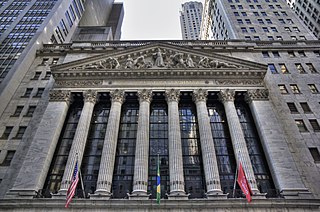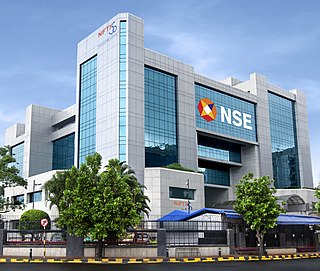Related Research Articles

The Nasdaq Stock Market is an American stock exchange based in New York City. It is the most active stock trading venue in the U.S. by volume, and ranked second on the list of stock exchanges by market capitalization of shares traded, behind the New York Stock Exchange. The exchange platform is owned by Nasdaq, Inc., which also owns the Nasdaq Nordic stock market network and several U.S.-based stock and options exchanges. Although it trades stock of healthcare, financial, entertainment, retail, and food businesses, it focuses more on technology stocks. The exchange is made up of both American and foreign firms, with China and Israel being the largest foreign sources.

A stock exchange, securities exchange, or bourse is an exchange where stockbrokers and traders can buy and sell securities, such as shares of stock, bonds and other financial instruments. Stock exchanges may also provide facilities for the issue and redemption of such securities and instruments and capital events including the payment of income and dividends. Securities traded on a stock exchange include stock issued by listed companies, unit trusts, derivatives, pooled investment products and bonds. Stock exchanges often function as "continuous auction" markets with buyers and sellers consummating transactions via open outcry at a central location such as the floor of the exchange or by using an electronic system to process financial transactions.
The Big Four are the four largest professional services networks in the world: Deloitte, EY, KPMG, and PwC. They are the four largest global accounting networks as measured by revenue. The four are often grouped because they are comparable in size relative to the rest of the market, both in terms of revenue and workforce; they are considered equal in their ability to provide a wide scope of professional services to their clients; and, among those looking to start a career in professional services, particularly accounting, they are considered equally attractive networks to work in, because of the frequency with which these firms engage with Fortune 500 companies.

A stock market, equity market, or share market is the aggregation of buyers and sellers of stocks, which represent ownership claims on businesses; these may include securities listed on a public stock exchange as well as stock that is only traded privately, such as shares of private companies that are sold to investors through equity crowdfunding platforms. Investments are usually made with an investment strategy in mind.

Ernst & Young Global Limited, trade name EY, is a multinational professional services partnership. EY is one of the largest professional services networks in the world. Along with Deloitte, KPMG and PwC, it is considered one of the Big Four accounting firms. It primarily provides assurance, tax, information technology services, consulting, and advisory services to its clients.

The Sarbanes–Oxley Act of 2002 is a United States federal law that mandates certain practices in financial record keeping and reporting for corporations. The act, Pub. L.Tooltip Public Law 107–204 (text)(PDF), 116 Stat. 745, enacted July 30, 2002, also known as the "Public Company Accounting Reform and Investor Protection Act" and "Corporate and Auditing Accountability, Responsibility, and Transparency Act" and more commonly called Sarbanes–Oxley, SOX or Sarbox, contains eleven sections that place requirements on all U.S. public company boards of directors and management and public accounting firms. A number of provisions of the Act also apply to privately held companies, such as the willful destruction of evidence to impede a federal investigation.

KPMG International Limited is a multinational professional services network, and one of the Big Four accounting organizations, along with Ernst & Young (EY), Deloitte, and PwC. The name "KPMG" stands for "Klynveld Peat Marwick Goerdeler". The initialism was chosen when KMG merged with Peat Marwick in 1987.

NYSE Chicago, formerly known as the Chicago Stock Exchange (CHX), is a stock exchange in Chicago, Illinois, US. The exchange is a national securities exchange and self-regulatory organization, which operates under the oversight of the U.S. Securities and Exchange Commission (SEC). Intercontinental Exchange (ICE) acquired CHX in July 2018 and the exchange rebranded as NYSE Chicago in February 2019.

National Stock Exchange of India Limited (NSE) is one of the leading stock exchanges in India, based in Mumbai. NSE is under the ownership of various financial institutions such as banks and insurance companies. It is the world's largest derivatives exchange by number of contracts traded and the third largest in cash equities by number of trades for the calendar year 2022. It is the 7th largest stock exchange in the world by total market capitalization, exceeding $5 trillion on May 23, 2024. NSE's flagship index, the NIFTY 50, is a 50 stock index that is used extensively by investors in India and around the world as a barometer of the Indian capital market. The NIFTY 50 index was launched in 1996 by NSE.

The Shanghai Stock Exchange is a stock exchange based in the city of Shanghai, China. It is one of the three stock exchanges operating independently in mainland China, the others being the Beijing Stock Exchange and the Shenzhen Stock Exchange. The Shanghai Stock Exchange is the world's third largest stock market by market capitalization. It is also Asia's biggest stock exchange. Unlike the Hong Kong Stock Exchange, the Shanghai Stock Exchange is still not entirely open to foreign investors and often affected by the decisions of the central government, due to capital account controls exercised by the Chinese mainland authorities.
OTC Markets Group, Inc. is an American financial services corporation that operates a financial market providing price and liquidity information for almost 12,400 over-the-counter (OTC) securities. The group has its headquarters in New York City. OTC-traded securities are organized into three markets to inform investors of opportunities and risks: OTCQX, OTCQB and Pink.

The Public Company Accounting Oversight Board (PCAOB) is a nonprofit corporation created by the Sarbanes–Oxley Act of 2002 to oversee the audits of US-listed public companies. The PCAOB also oversees the audits of broker-dealers, including compliance reports filed pursuant to federal securities laws, to promote investor protection. All PCAOB rules and standards must be approved by the U.S. Securities and Exchange Commission (SEC).

An entity-level control is a control that helps to ensure that management directives pertaining to the entire entity are carried out. These controls are the second level to understanding the risks of an organization. Generally, entity refers to the entire company.

Accounting scandals are business scandals which arise from intentional manipulation of financial statements with the disclosure of financial misdeeds by trusted executives of corporations or governments. Such misdeeds typically involve complex methods for misusing or misdirecting funds, overstating revenues, understating expenses, overstating the value of corporate assets, or underreporting the existence of liabilities; these can be detected either manually, or by the means of deep learning. It involves an employee, account, or corporation itself and is misleading to investors and shareholders.

The Audit Integrity and Job Protection Act is a bill that was introduced into the United States House of Representatives during the 113th United States Congress. The bill would "amend the Sarbanes-Oxley Act of 2002 (SOX) to deny the Public Company Accounting Oversight Board any authority to require that audits conducted for a particular issuer of securities in accordance with SOX standards be conducted by specific auditors, or that such audits be conducted for an issuer by different auditors on a rotating basis," according to a summary by the Congressional Research Service. The bill passed the House 321-62 on July 8, 2013.
National Financial Reporting Authority (NFRA) is the auditing and accounting supervision authority of India.
Kathleen M. Hamm is an American lawyer, federal regulator and fintech and cybersecurity expert, formerly a board member of the Public Company Accounting Oversight Board, and Counselor to the Deputy Secretary of the U.S. Department of Treasury for cyber policy and financial regulation. In April 2021, her alma mater, University at Buffalo School of Management, named her Accountant of the Year.

Chinese reverse mergers within the United States are accountable for 85% of all foreign reverse mergers in the early 21st century. A reverse merger, also known as a reverse takeover, is where a private company acquires a publicly traded firm or "shell company" that has essentially zero value on a registered stock exchange.

Luckin Coffee Inc. is a Chinese coffee company and coffeehouse chain. It was founded in Beijing in 2017. As of March 2023, it managed 9,351 stores which include 6,310 self-operated stores and 3,041 partnership stores. Monthly active customer numbers reached 500 million in June 2022. On 18 July 2024, the total Luckin coffee store number reached 20,000. The company operates shops, stores, and kiosks that offer coffee, tea, and food. Customers need to download an app to order and pay for drinks online. Luckin is currently headquartered in Xiamen. Luckin Coffee quickly expanded over the years and outnumbered the number of Starbucks stores in China by 2019.

The Holding Foreign Companies Accountable Act is a 2020 law that requires companies publicly listed on stock exchanges in the United States to disclose to the United States Securities and Exchange Commission information on foreign jurisdictions that prevent the Public Company Accounting Oversight Board (PCAOB) from conducting inspections. Under the law, such companies will be banned from trading and delisted from exchanges if the PCAOB is not able to audit specified reports for three consecutive years. The bill requires such companies to declare they are not owned or controlled by the Chinese government.
References
- ↑ Chen, Wang (December 4, 2019). "EQUITABLE Act: Background and Potential Application". Columbia Business Law Review . Archived from the original on December 22, 2019. Retrieved December 22, 2019.
- ↑ Robertson, Benjamin (June 6, 2019). "Latest U.S. Salvo Against Chinese Firms Could Benefit Hong Kong" . Bloomberg News. Archived from the original on July 2, 2019. Retrieved September 24, 2019.
- ↑ Kynge, James (September 5, 2019). "Trade war sucks in US-listed Chinese stocks" . The Nikkei . Archived from the original on September 24, 2019. Retrieved September 24, 2019.
- ↑ "Public Companies that are Audit Clients of PCAOB-Registered Firms from Non-U.S. Jurisdictions where the PCAOB is Denied Access to Conduct Inspections". Public Company Accounting Oversight Board. Archived from the original on October 16, 2019. Retrieved October 16, 2019.
- ↑ Poletti, Therese (June 26, 2019). "D.C. is finally paying attention to scary Chinese stocks, but Wall Street may pay the consequences". MarketWatch . Archived from the original on September 25, 2019. Retrieved September 25, 2019.
- ↑ Leonard, Jenny; Donnan, Shawn (September 27, 2019). "White House Weighs Limits on U.S. Portfolio Flows Into China" . Bloomberg News. Archived from the original on September 27, 2019. Retrieved September 27, 2019.
- ↑ Stevenson, Alexandra; Wong, Edward (April 30, 2020). "Chinese Coffee Chain's Scandal Renews U.S. Calls for Oversight" . The New York Times . Archived from the original on May 1, 2020. Retrieved May 1, 2020.